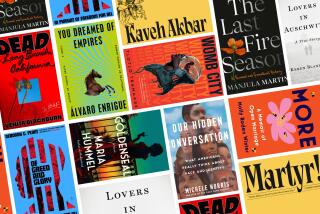A GUARD WITHIN by Sarah Ferguson (Pantheon...
- Share via
A GUARD WITHIN by Sarah Ferguson (Pantheon Books: $7.95) A riveting autobiographical account of a woman’s struggle for emotional survival after the sudden death of her psychoanalyst. Removed from England to a clinic in Switzerland, Sarah Ferguson writes to her dead analyst. The unnamed doctor--she always writes you-- was dearer to her than any other person, and for several years he was evidently her only connection with reality. Through her writing, Ferguson relives the events that have caused her so much pain, trying to find in them a meaning that will give her the strength to go on.
The relationship between this doctor and patient was no ordinary one. While it is clear that Ferguson’s crises severely taxed the elderly psychiatrist, it is equally clear why he found the relationship rewarding. Although he could never be sure of effecting her “cure,” he admired her courage. There was nothing he could do to prevent her numerous suicide attempts; over the course of the several years’ analysis, she is continuously at work on a short story in which, no matter how many rewrites she attempts, the heroine inevitably ends up killing herself. But even through Ferguson’s episodes of greatest torment, as a writer she remains unswervingly honest and thereby provides us with a moving testament. “A Guard Within”--a quote from Rainer Maria Rilke--does not read easily, but it is a document of rare force.
THE PANAMA HAT TRAIL by Tom Miller (Vintage Books: $6.95) Some of the best travel writing is done on slim pretext, and in this book Tom Miller sets out to discover the real story of the Panama hat. It transpires that Panama hats are made in Ecuador, not in Panama; the “Made in Ecuador” stickers are removed in the U.S. distribution process--but that comes later. Miller begins in Ecuador, where he seeks out the harvesters of the toquilla straw; thence he proceeds down the hat trail to weavers, transporters and exporters. He provides us with hat lore galore, but also the miscellaneous facts in which travel writing abounds. Miller’s lively style adds to the literature of Third-World travel such phrases as Bus Plunge Highway, along with tips for safety on the death-trap buses. (“The sobriety of the driver isn’t a factor. The presence of his wife or girlfriend is. He will want to impress her with his daring at the wheel, but he will also go to great lengths not to injure her.”) Eventually we follow the hats to New York, watching their purchase price increase from 65 cents in the village to $35 and up when they land on well-coiffed heads. TRUTH & LIES IN LITERATURE by Stephen Vizinczey (University of Chicago Press: $12.95)
When the unsuspecting reader encounters 55 essays (mostly book reviews) covering French, German and Russian works on subjects as diverse as communism, poetry, mass murder and the Mafia, all within the confines of one paperback, the response might well be a girding of the loins. Stephen Vizinczey’s wit makes it a swift gallop over such vast territory, as he characterizes anthropologists, politicians and poets both dead and living. (Vizinczey’s own books include “In Praise of Older Women” and “An Innocent Millionaire.”) Colin Turnbull’s “The Mountain People” provokes Vizinczey to profess himself “at a loss to understand why they (the Ik) didn’t eat him.” Huizinga’s book on Rousseau is “a labor of spite.” He greatly admires Stendhal, on the other hand, because he “isn’t shy about spite”; we also discover that “the first thing Stendhal does as a soldier is to fall off his horse.” The collection contains reviews of famous as well as obscure works, so there is much to be learned. Vizinczey’s highly self-conscious style can become abrasive, though--particularly when he begins sniping at one’s own favorite authors.
THE COFFIN TREE by Wendy Law-Yone (Beacon Press: $7.95)
This beautiful inaugural volume in the Asian Voices series tells the story of a Burmese brother and sister sent out of their country during a violent political upheaval. They land in the United States, where their life is that of many refugees: uprooted, grim and meaningless. After months of an apologetic existence with a host family, the two strike out on their own. They experience the endless humiliations of poverty in a country where wealth is taken for granted. The narrator’s brother increasingly despairs as job offers turn into menial labor at below minimum wage; when he dies, the sister breaks down and is institutionalized. These are characters whose survival--as long as they are able to manage it--can only be explained by the statement that opens and closes the novel: “Living things prefer to go on living.”
PARIS WAS YESTERDAY by Janet Flanner (Harcourt Brace Jovanovich: $8.95) Janet Flanner wrote the Letter From Paris column for The New Yorker magazine signed with her nom de correspondance, Genet. The pieces in this collection are selected mainly from those columns. They are arranged by year, beginning in 1925, when Flanner reports on Dadaist Tristan Tzara’s marriage to a Swedish heiress: “He and his wife, on what the French law now probably calls his money, are building a huge modernist house in Montmartre.” The volume ends at the start of the war. A good way to read this book is to start with the index and run down the enormous list of famous names. On the French reception of Mae West: “Miss West has elicited praise from Paris that would give her a liberal education if she traced it all down.” The volume might have made for more serious and satisfying reading had the editor included more of Flanner’s fully developed pieces.
More to Read
Sign up for our Book Club newsletter
Get the latest news, events and more from the Los Angeles Times Book Club, and help us get L.A. reading and talking.
You may occasionally receive promotional content from the Los Angeles Times.






